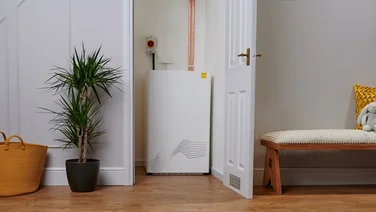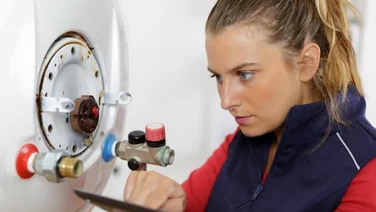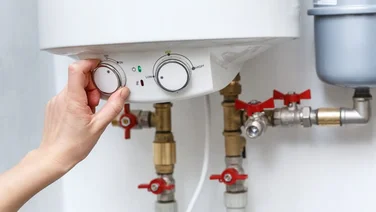✔ Biomass boilers are better for the environment than gas boilers
✔ But they release more emissions than heat pumps
✔ They cost £16,000 – but the Boiler Upgrade Scheme can reduce this price
Gas and oil are on their way out, as we move towards greener ways of heating our homes.
The government has gotten rid of the gas boiler ban so much it might as well be a homeopathic product, but it still says it wants phase out 80% of gas boilers by 2035.
So if you’re considering the cost of a new boiler, you can still buy one after 2035.
Thankfully, there are still plenty of grants for alternative heating, such as the government’s Boiler Upgrade Scheme will offer lump sum grants to households installing heat pumps and – in some cases – biomass boilers.
This will result in increased popularity for biomass machines, so here’s why you should – or shouldn’t – look at getting one for your home.
And if you’d rather choose a different boiler, there are plenty of other options out there. Just fill in this quick form, and our suppliers will be in touch with their best prices.

What is a biomass boiler?
Biomass boilers heat your home in much the same way as any other boiler, except they’re fuelled by wood in the form of pellets, chips, and/or logs.
Most domestic biomass owners decide to use pellets, which are widely available.
Your biomass boiler will burn this wood to heat water that will travel to your radiators, taps, and shower, keeping you warm and cosy all year round.
You can either get a biomass boiler that you have to top up manually, or a version with an automated feed hopper, which will supply the machine with additional wood at regular intervals of your choosing.
All you’ll need to do is top up the supply every so often, choose somewhere to store your supply of wood, switch it on and off at the right times for you, and empty the ash once per month.
You can even pour the ash onto your compost pile, to help your garden to grow more effectively.
Are biomass boilers more efficient than gas boilers?
On average, biomass boilers are not as efficient as gas boilers – but it’s extremely close.
The two products have near-identical upper limits: the Viessmann Vitodens 200-W gas boiler has a 98% efficiency rating, while the Grant Spira biomass boiler can reach 97.4% efficiency.
That means both products generate slightly less than one unit of heat for every unit of fuel they consume.
However, the lower limits aren’t as impressive with biomass boilers.
This is largely because a law introduced in 2018 mandated that all new gas boilers in the UK must meet an efficiency level of at least 92%.
Biomass machines don’t have to meet the same standard, which has led to less of a focus on efficiency levels in new biomass models.
This, in turn, has resulted in most biomass boilers falling in the 80% to 94% range for efficiency.
The good news is that it’s possible to find a biomass boiler that’s just as efficient as your old gas boiler, if not more so – you may just have to do some research.
How much does a biomass boiler cost?
The average biomass boiler costs £16,000 – but this will depend on a few factors.
You can buy a cheaper model that won’t provide as much warmth for around £12,000, or pay about £22,000 for a machine that can heat a large home.
Bear in mind that it also usually costs at least £2,000 to have a biomass boiler installed, which puts the typical purchase and installation cost at £18,000 overall.
However, once the machine is set up, the running costs hover at a reasonable £950 per year for a large house. Although this might sound like a lot, it’s not too shabby compared to the current price cap on owners of gas boilers.
For our full analysis, check out our biomass boiler costs page.
Are biomass boilers environmentally friendly?
Biomass boilers seem like they should be good for the climate – after all, they burn wood, which is a renewable resource – but they’re not actually environmentally friendly.
The UK government notes: “Unlike other renewable sources of electricity, the combustion of biomass is not free of greenhouse gas emissions.”
Biomass boilers fuelled by wood pellets – the most common kind in the UK – emit 0.052 kg of greenhouse gases per kWh.
The average home requires 13,600 kWh per year for heating, according to government research – which means biomass boilers emit 707 kg of greenhouse gases per year, on average.
That’s 11.5% of the average Brit’s carbon footprint – better than gas boilers, which make up 44% of a person’s annual emissions, but considerably worse than heat pumps.
Overall, biomass is responsible for 13 to 16 million tonnes of greenhouse gas emissions per year in the UK, according to Chatham House analysis.
And that’s not the end of it. 7.8 million tonnes of wood pellets are brought to the UK each year, according to government data – 82% of which travel from the US and Canada, releasing shipping emissions as they go.
A good chunk of these pellets are used to fuel biomass power plants, which you can read about in our guide here.
The expert view
Dr Mathew Heal, who is the chair of atmospheric chemistry at Edinburgh University, told The Eco Experts that you shouldn’t opt for a biomass boiler unless it’s your only good option.
“My personal view is that people should be very reticent about going out and buying biomass boilers, because the regulations aren’t that stringent. By using these boilers in a domestic setting, you are contributing to local air pollution,” he explained.
“If you don’t need it, I think you should be discouraged.”
He added that when it comes to air pollutants, “it doesn’t matter what fuel you’re using: all combustion has the potential to release NOx (nitrogen oxide) emissions. It all depends on the burning process.
“The trajectory we’re on is that electricity is getting cleaner, so using electricity to heat your home has the potential to be much cleaner even than a biomass boiler.”
Pros and cons of biomass boilers
| Pros | Cons |
|---|---|
| Provides heating to off-grid homes | Usually less efficient than gas boilers |
| Releases less CO2 than gas boilers | Not green – each boiler emits 0.7 tonnes of greenhouse gases per year |
| May qualify you for a Boiler Upgrade Scheme grant | More expensive than most heating systems |
| Running costs are reasonable, at around £750 per year | Reduces the number of CO2-capturing trees in the world |
| Requires storage space for wooden fuel |
Should you get a biomass boiler?
As well as cost, efficiency, and environmental impact, there are a few other factors you should consider before you decide whether or not to get a biomass boiler.
Fuel
For your new biomass boiler to work, you’ll need wood.
You should consider in advance whether you would buy logs, chips, or pellets, which supplier you would buy it from (choose from this list of government-approved suppliers), and where you would store it.
You can make significant savings by storing a few tonnes of fuel at once – but for that to work, you’ll need to clear about 2.1 m³ of space – the equivalent of a large cupboard.
Your chosen storage room should also be a convenient delivery spot, so that your supplier can wheel the fuel straight in.
Permission
Most homes won’t need permission to install a biomass boiler, but it does happen.
It’s worth checking with your installer whether there are any hoops you’ll need to jump through before you can bring a biomass machine into your home.
Flue
You’ll either need a new, insulated stainless steel flue pipe to release the carbon emissions and particulates that you don’t want in your home, or an existing chimney.
However, if you choose the latter option, make sure to ask your installer if your chimney needs insulation before it can qualify as legal and safe.
Space
As well as clearing space for your fuel storage, you’ll also need to make room for the machine itself – and biomass boilers are behemoths.
While gas boilers usually weigh 30-50 kg, their biomass counterparts weigh 200-400 kg.
The Grant Spira 36kW is 338.5 kg of solid machine, and takes up 1.96 m³ of space.
For context, the Viessmann Vitodens 200-W – a relatively large gas boiler – is 48 kg and takes up just 0.14 m³ of room – meaning that Grant’s biomass model is 14 times bigger.
What other alternatives are there?
There are plenty of excellent options for homeowners who want to ditch their gas boiler for a cleaner, more efficient heating system.
As well as biomass boilers, there are also log burners, air source heat pumps, their more consistent – and more expensive – sibling, the ground source heat pump, and even high temperature heat pumps.
And soon, you may be able to heat your home with a hydrogen boiler, microwave boiler, or infrared system.
Summary
Biomass boilers are better for the environment than gas boilers, and just as efficient – if you get the right model.
If you have the space, the supplier, and the financial security to buy a biomass boiler, it may be your best option – though we’d encourage you to check out our page on the best air source heat pumps before you decide.
It’s always worth taking a look at all the options while you’re working out what your next move should be.
If you end up wanting a different type of boiler, just fill in this short form, and our suppliers will be in contact with their best prices.






